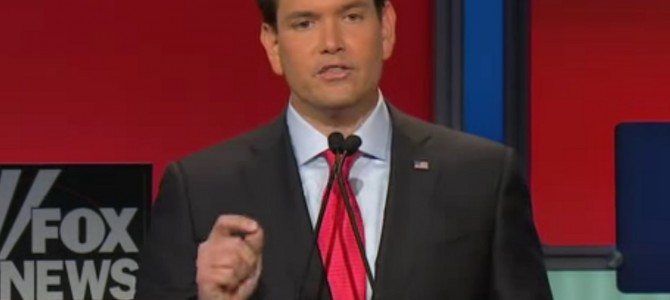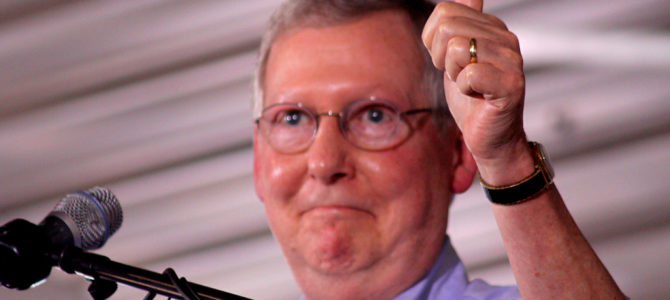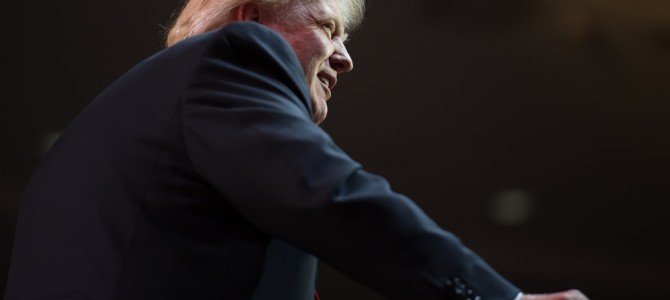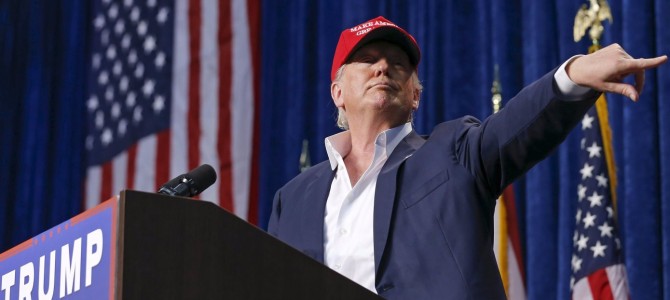
The only problem with writing about last night’s GOP debates, as one reader acknowledged, is that there is enough content contained within to fill seven Transoms. So I will try to cover everything while keeping comments brief, when I could spend an entire edition merely teasing out the most awkward banter session I have ever seen on live television conducted by serious professionals. It was like hour eight of a Thanksgiving Day parade in which the floats had hit a roadblock further up the road. But once things got rolling, oh, how they rolled. For now, let’s try to get our arms around what is probably the best and most interesting debate we’ve seen in Republican presidential contests in two decades, and run through the potential outcomes for each candidate. The debate transcript is here. The topline takeaway for me from the evening: there were a lot of winners and very few losers, and some performances were unexpected.
I concur with Matt Continetti: Marco Rubio had, hands down, the best performance. Rubio has been slipping in the polls significantly of late, fading as others rose and the field became crowded. His command of the issues and ability to inject inspiration into relatively brief snippets of dialogue was impressive. Rubio’s debate performance was particularly impressive in that he didn’t spend a lot of time on foreign policy – he handled a tough question from Megyn Kelly on abortion very capably, spoke to economic concerns intelligently, defended himself on immigration, and made a clear case for forward-looking optimism that really should charm most mainstream conservatives. His only defect is that, man, did he need some chapstick near the end.
If Rubio can’t get a bounce from lighting up the HDTV with a performance like that, it will say something about how much his bad blood over immigration has hampered his ability to gain momentum. Most importantly, he did not seem at all like a kid.
Donald Trump will get a lot of headlines for his scrap with Kelly over his misogynist tendencies. But I actually think he won, too, in his own way. You can parse his responses as being incoherent or inconsistent, but Trump understands that the worst thing you can do in a key moment is depart from your brand. If he had responded to that first hand-raising question with anything other than his normal approach of screw-you flippancy, it would have been the sort of Beta male approach that could have defined his debate performance.
Remember: Trump does not actually poll well among Tea Partiers or conservatives. His base is made up more of those stubborn Independents. Trump is right where his backers are at this point – many of them so fed up with both parties that they too would refuse to support the eventual nominee, nor are they offended at all by their candidate’s political incorrectness. Contra my colleague Mollie Hemingway, who runs through his ten worst moments here, there was nothing in Trump’s performance that I found to be disqualifying among the set that loves him so.
What hurt Trump more during the course of the evening than his prior stances or his vague belligerence was the performances of those who could steal some of his populist thunder and take away some of his backers. On this count, Frank Luntz’s focus group found that Mike Huckabee and Ted Cruz had the best luck, moving Trump voters away to others who seemed more presidential. Huckabee in particular had a very good night for someone long removed from the debate stage. Cruz, on the other hand, seemed so unlike himself – very quiet, asking permission to interrupt, passing on an opportunity to pick direct fights, and with very little of the grandstanding hostility some might expect.
Cruz and Ben Carson were both smack dab in the middle of speaking time, but there’s little question that they didn’t make any of the headline remarks today. Not unexpectedly, Carson seemed very out of his element. He sounded the same notes he does in his well-attended speeches, and you can see his appeal in that sense. But of all the candidates who ought to be concerned about making it to the next top-ten debate stage – and someone has to be prepared to leave given Carly Fiorina’s performance – Carson might be the candidate likeliest to see a drop, not due to any real stumble but simply because he had the lowest energy of anyone on the main stage.
Low energy was not a problem for Chris Christie or Rand Paul. Paul spoke the least of any of the candidates on stage, but was the most eager to be aggressive and start fights with the others. While he closed with a bit of sunny uplift and expansionism, where Cruz stood back from the fray, Paul has decided his path back to relevance involves getting aggressive, and he’s probably right. There’s nothing more to be gained from the nice-guy fusionist path that has gotten him to 4.5 percent in the polls. The Christie-Paul mini-debate on security policy was the best moment of the evening for both candidates: for Christie’s backers, it showed him as a confrontational security hawk; for Paul’s, a Bill of Rights zealot unwilling to be cowed by a statist bully. Both candidates need more interactions like that in order to rise.
Scott Walker was Scott Walker: Decent Midwestern Republican, no flash but nothing too problematic. I was surprised at the nature of the question to him on abortion, given that it is so divorced from the national policy debate. Is Fox News under the impression we are on the cusp of a constitutional abortion ban? Why, on a day when Mitch McConnell said definitively he will not force the president to shut down the government to defend Planned Parenthood, would you not ask about that? Walker will have to defend himself a bit on these social issues going forward, but he otherwise performed fine and shouldn’t lose any support.
Jeb Bush had a decent if uneven evening, but seemed more rusty at debating than he might have hoped. More than once, he nailed most of an answer but struggled to close it off. But he defended himself capably on Common Core and the dynastic question, and it’s possible he will get better at this going forward. The largest unasked question for him should have been about his brother’s actions and the bailouts during the financial crisis, which ought to have been put to every candidate and will eventually challenge them all.
As for John Kasich: I remain surprised that no one chose to attack him outright, and that the toughest question he received was from Megyn Kelly. It’s possible that given his advantage in the crowd – full of members of the Ohio Republican Party – candidates chose to wait to get into it with his answer to Kelly’s question (which was, basically, yeah, I’ll totally expand other government entitlement programs if I think it’s right). His handling of the gay child question (which was oddly phrased) was solid. The commentariat believes Kasich is hurting Jeb’s ability to rise. In New Hampshire, that may very well be true.
For the undercard: whoever has schooled Carly Fiorina in the interim between this and her embarrassing performance in California’s Senate race ought to be making a bucket of cash at the end of this cycle. It really is night and day for her. Fiorina followed a solid performance with a more impressive interview with Chris Matthews, which you should watch here. It’s still mostly anti-Hillary rhetoric that is elevating her, so there’s a question of how sustainable this is, but she is really very good at this now in a way she wasn’t before.
Bobby Jindal had a decently strong performance in the early debate, with a combination of his typical populist zingers and a command of policy that showed. Interestingly enough, it was his line about assimilation and immigration near the end of the debate that trolled the Left the most. Noah Rothman responds here. The more Jindal has opportunities to speak to policy, the more his seriousness shines in comparison to candidates who just recite their resumes.
Jindal came in second and Rick Perry came in third in the Fox polling on performance in that debate (which Fiorina crushed). It seemed to me to be hampered more than any other candidate by the lack of a crowd. His performance has improved since 2012, but he also had more than one applause line or joke that might’ve gone over well with someone to react. There was an unsteadiness about the whole early debate because of this, and it wasn’t helped by moderators who asked stilted, odd, and questions that were aggressive without being intelligent. The first round of questions was: “Why do you suck?” The second was: “Donald Trump, amiright?” This didn’t help matters at all.
As for the rest of the undercard: Rick Santorum had a few okay moments but seems to be fading as his backers move on to other less divisive candidates; I didn’t think George Pataki handled the Planned Parenthood question all that poorly, but he lied about expanding Medicaid; Jim Gilmore, why are you here?; and Lindsey Graham needs some kind of intervention – he seemed clinically depressed. I’m no Graham fan, but someone buy the man a soft-serve or something.









